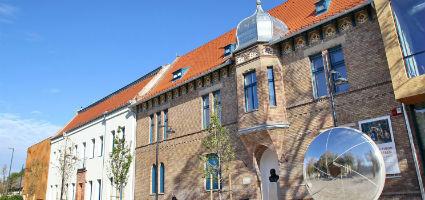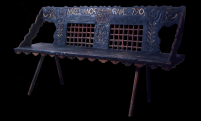 |
Address: 6800, Hódmezővásárhely Dr. Rapcsák András út 16-18.
Phone number: (62) 242-224
E-mail: tjm@tjm.hu
Opening hours: Tue-Sun 10-17
|
|
Ticket for adults
|
600 HUF
|
|
|
Ticket for students
|
300 HUF
|
|
|
Ticket for pensioners
|
300 HUF
|
During the heydays of folk craft furniture painting, in the 19th century, Hódmezővásárhely was one of its centres. The earliest painted furniture made by carpenters we have are from the 18th century. One of them stands out. It is the painted furniture of the Old Church that was commissioned from the carpenters in 1732. Local masters, however, applied certain elements, but created a new style for furniture: using dark blue for bases with lively, floral patterns, red (cinnabar) mainly tulips, roses and pomegranates.
The heydays of the new Vásárhely painted furniture is somewhere between 1830 and 1850, when they served as a model for other, smaller furniture centres in the area. On items from this era, ornaments are in a specific and characteristic order. The bouquets of flowers are often in vases that suggest Renaissance influence, which is also traceable in the name "Italian jug". The director of the exhibition Vera Nagy stressed that Great folk furniture painting is the third treasure of art in Vásárhely. Their uniqueness and specificity come from the fact that this profession has now completely disappeared by today unlike the pottery and embroidery art of Vásárhely - said the folklorist of the Tornyai Museum.
About thirty furniture, including some of the most characteristic are on display in the exhibition halls bridal (popularly known as the tulip) chests, chairs, benches, chairs, cradles in addition to carved and painted mirrors. The last Hall presents phases of the restoration work: the visitors will find out what the original and the restored items were like, they will also see what types of works were carried out through surrogates and recovery work. The felt side of one of the collections from 1851 is untouched, while the lower right field separated with chalk on them show layers restored.



